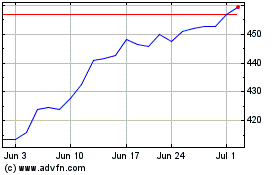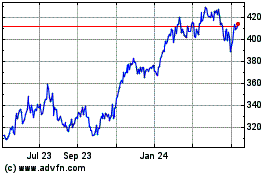By Laura Stevens and Tripp Mickle
Apple Inc. and Amazon.com Inc. are bolstering the teams that run
their Siri and Alexa virtual assistants, part of a string of recent
moves by technology giants to step up competition in an area seen
by many as the future of computing.
Amazon is adding hundreds of engineers to the Alexa program and
giving it hiring preference over other divisions, according to
people familiar with the company's thinking. It also has put Tom
Taylor, a veteran Amazon executive known for building up
high-growth divisions, in charge after the former Alexa chief
retired.
Apple, meanwhile, has shifted oversight of its Siri system to
Craig Federighi, its top software engineer, after five years under
the leadership of another senior vice president, Eddy Cue. That
move comes amid concerns that Siri, which popularized voice
assistants when Apple introduced it in 2011, has lost ground to
rivals including Alexa and Alphabet Inc.'s Google Assistant.
Voice-driven virtual assistants like Siri and Alexa, powered by
artificial-intelligence technology, are rapidly gaining popularity
by making it simpler for people to perform computing tasks from
searching for information to shopping to turning on home lamps.
More than 4 billion consumer devices by the end of 2017 will make
use of some kind of digital assistant, according to IHS Markit, a
market research firm.
Apple, Amazon, Google, Microsoft Corp. and Samsung Electronics
Co. are racing to make their assistants more powerful and
pervasive, in part by trying to embed them in more devices. Apple
still has the greatest reach among voice assistants, with Siri
accessed monthly on more than 375 million Apple devices across 36
countries. Amazon's introduction of the Alexa-powered Echo speaker
nearly three years ago sparked a new land rush, prompting Apple in
June to unveil a rival device, the HomePod, that goes on sale at
the end of this year.
The companies bring different strengths to the fight. Because of
their dominance of the smartphone market, Apple, Google and Samsung
have broad reach and enormous volumes of user data that they can
use to train their assistants. Google, like Amazon, also draws data
from its own home speaker, which uses the Google virtual assistant.
Microsoft's Cortana is mainly available on computers running
Windows 10.
Amazon draws its user data primarily from its retail website,
which gives it an edge for shopping and related tasks. It also
currently dominates in smart speakers -- its Echo has about
three-quarters of the U.S. market for such devices, with more than
11 million sold through the end of last year, according to analyst
estimates.
Amazon also has been aggressively signing deals with other
companies to add Alexa to products ranging from Ford Motor Co. cars
to Sears Holdings Corp.'s Kenmore refrigerators. Samsung has
outlined a similar vision for its recently launched assistant,
called Bixby.
Google said this week that it would open its assistant to other
speaker makers including Sony Corp., and to appliance makers like
LG Electronics Inc., to incorporate the assistant into dryers and
vacuums.
Google also is taking aim at Amazon's e-commerce stronghold with
a partnership announced last month with Wal-Mart Stores Inc. to let
users of its Google Express shopping service order from the retail
giant by voice via Google's virtual assistant.
Amazon, meanwhile, announced a deal this week with Microsoft --
its fierce rival in the business of cloud computing -- to link
their virtual assistants so that people could, for example, use
Alexa to access Microsoft's Cortana and check their calendars in
Outlook.
Apple, in addition to rolling out a smart speaker, increasingly
is enmeshing Siri in its Mac and iPhone operating systems, which
Mr. Federighi also manages. His new role was noted on Friday in a
change to his biography on Apple's website. An Apple spokeswoman
confirmed the change but declined to comment further.
Gene Munster, head of research with Loup Ventures, said that Mr.
Federighi brings more of a technical background than Mr. Cue, who
heads internet software and services and is leading Apple's push
into original video in Hollywood. Mr. Munster expects Mr. Federighi
to open up Siri to more third-party developers -- an area where
Amazon is far ahead -- allowing those outsiders to use the service
much like he has done with Apple's iOS system.
"This whole area around voice is getting super competitive and
it's important Apple steps up their game," Mr. Munster said. "This
change to Craig overseeing Siri is one way to do that."
The ability to train assistants effectively is critical to
making them more accurate and effective in responding to
queries.
Google's smart speaker, which responds to "OK, Google," now
understands questions as well as Alexa, at about 95%, according to
Loup Ventures research, which tested 800 questions on both systems.
Google previously lagged behind in a February test, understanding
about 77% of queries, versus 94% for Alexa. Google answered 65% of
the questions correctly, compared with 54% for Alexa, although both
improved.
Mr. Munster said Google's resources pose a worry for Amazon. "If
I am the person who is in charge of the Echo, I would be concerned
about the war chest of data that Google has to make this experience
better," he said.
The ability to train the assistants effectively is critical to
making them more accurate and effective in responding to users'
queries.Amazon has been accelerating the growth of its Alexa staff
rapidly for years, and currently has nearly 1,500 openings
mentioning Alexa on its job site. New engineers are developing
features to help push Alexa deployment, with the goal of generating
more data via greater adoption, according to the people familiar
with Amazon's thinking.
Amazon's Mr. Taylor, a nearly 20-year company veteran, took
charge in June and previously ran seller services, which has grown
significantly over the past few years.
Amazon declined to comment on its Alexa strategy.
Amazon needs Alexa to get smarter to keep customers like Josh
Vickerson, who bought a Dot -- a smaller cousin of the Echo -- late
last year when it was on sale for $35. The 24-year-old originally
tried out features like playing Jeopardy and integrating his
Fitbit. Now he uses it to play videos, set timers and turn off the
lights.
"It's fun to play with when you first get it," said Mr.
Vickerson, a Rochester, N.Y.-based web developer. But "there's no
enormous value proposition." He says he is considering purchasing
Apple's new $349 HomePod after it comes out in December.
(END) Dow Jones Newswires
September 01, 2017 19:24 ET (23:24 GMT)
Copyright (c) 2017 Dow Jones & Company, Inc.
Microsoft (NASDAQ:MSFT)
Historical Stock Chart
From Mar 2024 to Apr 2024

Microsoft (NASDAQ:MSFT)
Historical Stock Chart
From Apr 2023 to Apr 2024
